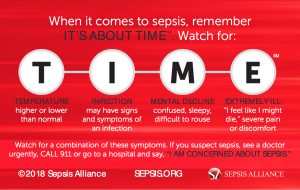Whoopi Goldberg, Pneumonia, and Septic Shock in the News
March 10, 2019
Whoopi Goldberg made an announcement last week when she shared why she had been absent from The View for several weeks. She had contracted pneumonia, which triggered sepsis, and she went into septic shock. In her words, she was “close to leaving the earth.” What makes Ms. Goldberg’s announcement unique is she mentioned that she had sepsis. Many famous people who develop infections and sepsis (or their spokespeople) don’t mention sepsis or septic shock when discussing their illnesses. The last time sepsis got so much public attention was when Muhammed Ali died after going into septic shock. It is interesting to note, however, that even though Ms. Goldberg mentioned septic shock in her announcement, there are still some news outlets that only mention that she had pneumonia, leaving out the part about septic shock.
The two most common infections that cause sepsis are urinary, as from a urinary tract infection, or respiratory, as from pneumonia. Pneumonia can develop if you contract a bacterial, viral, or fungal infection, but it can also occur in other ways. For example, someone who has difficulty swallowing may aspirate food or drink (get food or drink into their airway) and can develop aspiration pneumonia. Although all these types of pneumonia have different causes, they can be severe and lead to sepsis – and death.
Not all pneumonia can be prevented. Some cases occur as a complication of another infection, such as influenza. Others occur after a patient has anesthetic for surgery or is on a ventilator in an intensive care unit. Many people don’t know how or where they got pneumonia – it just seemed to happen. But there are ways to lower your risk of getting pneumonia. The most important one is to get vaccinated against pneumococcal pneumonia. It is caused by a bacterium called Streptococcus pneumoniae. The vaccine is often recommended for the elderly and for people who are at high risk of developing the infection.
Other ways of reducing your risk after having surgery includes moving about as much as you can, even if it is difficult and painful. Taking deep breaths, deliberately coughing, and using an incentive spirometer (a plastic device with a little ball that moves when you breath in and out an attached tube) all help move the air in your lungs. This is particularly helpful if you are unable to get out of bed.
Of course, not all pneumonia can be prevented, so it’s vital to seek treatment if you develop the signs to prevent worsening. Even so-called “walking pneumonia” can cause serious complications. The most common symptoms of pneumonia are:
- Fever
- Cough, with phlegm
- Shortness of breath
- Sweating
- Shaking chills
- Headache
- Muscle pain
- Fatigue
- Chest pain with breathing
If you have pneumonia, you may be told that there isn’t any treatment if you have viral pneumonia, although in some cases, doctors may prescribe anti-viral drugs. Bacterial pneumonia is treated with antibiotics, and fungal pneumonia with anti-fungals. While you are recovering, it’s important to watch for signs of the infection worsening or of sepsis. To help people remember the most basic sepsis symptoms, think of TIME:
T– for temperature, which is higher or lower than normal
I– for infection. There may be signs or a procedure that may have caused an infection.
M– for mental status. The patient becomes drowsy, confused, or difficult to rouse.
E– for extremely ill, “I feel like I might die.”

Sepsis must be treated quickly to prevent complications, such as organ failure, amputations – and death. Sepsis Alliance is grateful that Ms. Goldberg is recovering and appreciates the conversation she started about sepsis. It raises awareness of this condition that takes so many lives. If more people learn about sepsis, the signs, and the fact that sepsis is a medical emergency, so many lives and limbs can be saved.
If you suspect that you or a loved one has sepsis, call 911 and say, “I’m concerned about sepsis.”
To learn more about pneumonia and how it relates to sepsis, visit Sepsis and Pneumonia. And click here if you would like to see which other famous people have contracted sepsis.































